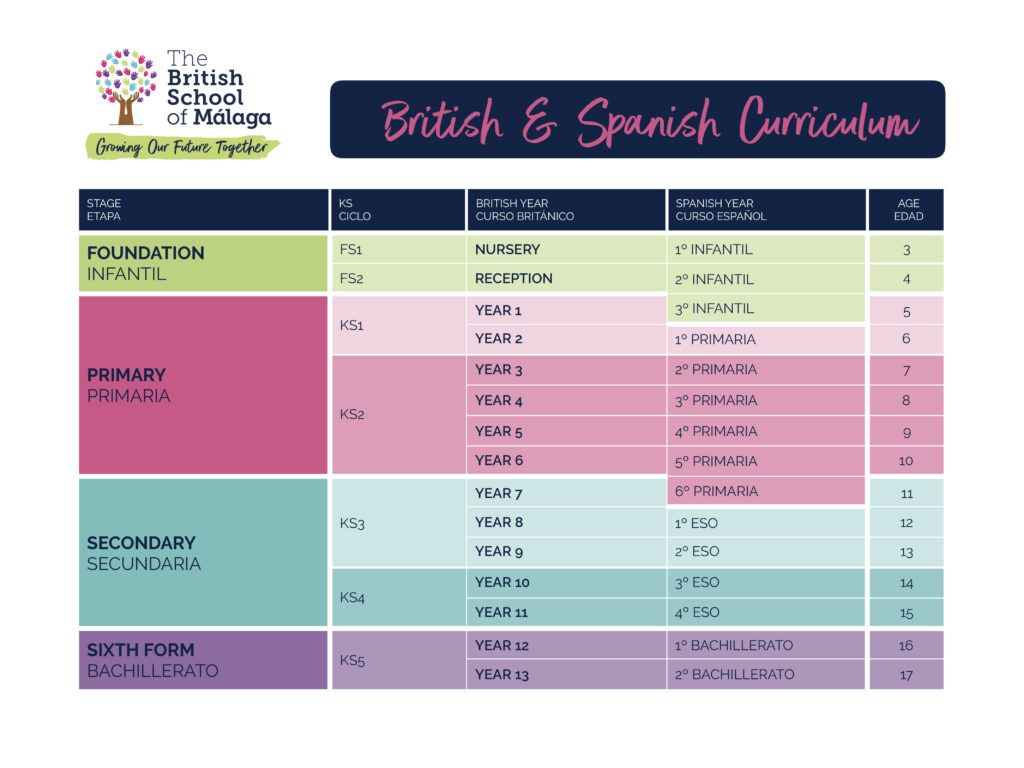CURRICULUM
The British system is based on the acquisition of skills rather than the accumulation of knowledge. Therefore, it is very practical, creative and relies significantly on play and interpretation. Among children, participation, initiative, leadership, self-confidence are encouraged and they regularly exercise in such essential performances as public speaking, debate or participation in selection interviews.
Students are continually directing their own learning and starting in the last years of Secondary School they make choices about the subjects they are going to take and which ones they are going to take in official exams.
The British School of Málaga
- The educational project. We prepare people, not just students. We prepare for life, not just for exams. We grow, we learn, we progress together.
- Double Degree. Students obtain both British and Spanish certification and can access any national or international university.
- The language of the world: English. It is our language and we teach it as it would be done in the United Kingdom, from 3 to 18 years old, with native teachers.
- The abilities. Our system encourages practical skills and our core values focus on their development.
- The opportunities. Extracurricular life, international exchanges, discussion forums and many opportunities for students to expand their lives beyond the classroom.

Spanish Curriculum Convalidation
At The British School of Málaga, British teaching is complemented with Spanish subjects. In fact, the Spanish Department has a great specific weight, both in Primary and Secondary and, of course, in the stage equivalent to Baccalaureate.
Students study their British subjects like in any English school in the world and, in addition, a key selection of Spanish subjects that make our school a truly bicultural institution in the heart of Malaga. The Spanish subjects are: Language and Social during the Primary stage; Language and Literature along with Geography and History when they enter Secondary School; and finally, they have an offer of 10 Spanish Baccalaureate subjects of their choice, of which they choose and take 2 depending on the modality and academic future of each student.
This British curriculum model complemented with Spanish subjects provides us with a unique advantage: they obtain both the British qualification and the ESO and the Spanish Baccalaureate, the double qualification. When they finish their education at The British School of Málaga, students decide whether they want to go to British, international or Spanish universities, in all cases directly.
We have a department dedicated to the homologation and comprehensive support of Spanish studies. The Technical Directorate of the Spanish Section is in charge of coordinating all mandatory studies of Spanish Language and Culture, both in Primary and Secondary, as well as managing the relevant authorizations and documentation with the Education Delegation of the Government of the Junta de Andalucía.
Another task carried out by the Technical Directorate is the homologation of British studies to the Spanish equivalents. At the end of Year 11, the homologation to the ESO (Compulsory Secondary Education) qualification is processed and at the end of Year 13, the homologation to the Spanish Baccalaureate qualification is processed.
At The British School of Málaga, the same Technical Management department is in charge of managing direct access to the Spanish University for all those students who want to apply for a place in both public and private universities.






